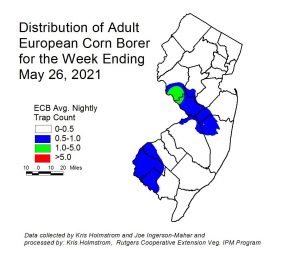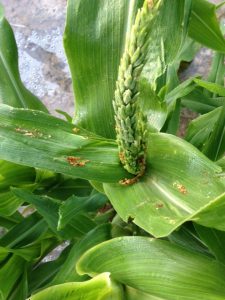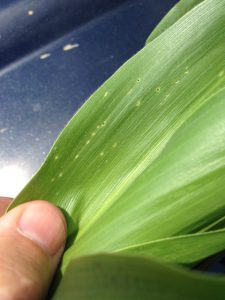Ivy-leaf morning glory seedlings with one set of true leaves seemingly sprang up over night with the storms that tracked across Southern NJ Wednesday night. This large seeded annual twining vine can significantly reduce yields in soybeans. Where in the field these seedlings are located should be monitored closely over the next few days. Don’t assume preemergence herbicides that have activity on seedlings up to four-inch morning glories are still going to do the job. It all depends on how many days (or weeks) went by since herbicides were applied and if this was the first activating rainfall since application.
Morning glory seeds can germinate at multiple depths in the soil profile escaping what soil residual activity was present before the rains came. Scouting cues of suppressive herbicidal activity from products like Valor, Canopy, Classic, Authority, Flexstar, Firstrate are: Noticeably larger plants along field edges that did not receive spray coverage, and more of them; but few plants further into field interiors where herbicides were applied. Look also for signs of herbicide activity over the next few days.
Preemergence products with some activity on morning glories have group 2, 5 and 14 modes of action and have somewhat similar symptoms of weed injury. “Seedling weeds will then either turn brown and die shortly after being exposed to light, or will cease growing, turn yellow and then turn brown from the growing point out.” – page 4, 2010 Valor XLT Soybean Label, Valent Product EPA Reg. No. 59639-117).
Even one morning glory left unchecked in a foot of row can reduce soybean yield in that row by 50%. If flushes of morning glories are emerging throughout the soybean crop, consider lightly cultivating if at all possible if row spacing permits before that early (full season) flush of morning glories have a chance to entwine. However, keep in mind that cultivation will incorporate surface applied herbicides. Too deep and this could reduce effectiveness against small-seeded broadleaf weed seeds brought up closer to the soil surface.
In beans, post-emergence herbicides applied to emerged morning glories generally only provide suppression and may not prevent seed production. This is generally true for all large-seeded annuals.
Don’t let those roadside edge plants outside the field go to seed. Other plants seen along with ivy morning glory yesterday are emerging jimsonweed and cocklebur seedlings, both large-seeded annuals. If you see a hand sized goose foot shaped plant it could be giant ragweed, also a large seeded annual.
 A Missouri woman named Jane Heisey died on her family farm recently.
A Missouri woman named Jane Heisey died on her family farm recently. 



